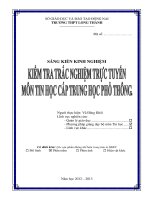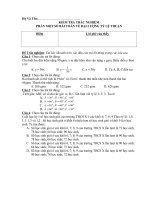ĐỀ KIỂM TRA TRẮC NGHIỆM THEO CHỦ ĐỀ BÀI HỌC Unit 9: DESERTS ppt
Bạn đang xem bản rút gọn của tài liệu. Xem và tải ngay bản đầy đủ của tài liệu tại đây (65.97 KB, 5 trang )
ĐỀ KIỂM TRA TRẮC NGHIỆM THEO CHỦ ĐỀ BÀI HỌC
Unit 9: DESERTS
I. PRONUNCIATION
Choose the word whoseunderline part is pronounc differently from that of the
others in the
1. A. circle B. center C. census D. cancel
2. A. area B. arise C. arrange D.
arrive
3. A. dessert B. desert C. deserve D.
December
4. A. roughly B. tough C. enough D.
cough
5. A. gently B. germ C. gear D. gene
II. GRAMMAR & VOCABULARY
Choose the word or phrase (A, B, C or D) that best completes each sentence.
6. They made an aerial survey; that is, they made a survey____________________ .
A. by ship B. by plane C. on foot D. by
telescope
7. ‘Hummock grasses grow in loose sand on the crest'. The word 'crest' in this
sentence is closest in meaning to ________ .
A. 'side' B. 'bottom' C. 'top' D.
'inside'
8. Eight kilometers is______________equivalent to five miles.
A. exactly B. roughly C. rarely D.
precisely
9. Older people _________________ a large proportion of those living in poverty.
A. comprise B. consist C. compose D.
compound
10. She has the windows open, _______________ cold it is outside.
A. however B. therefore C. but D. so
11. There is still much to discuss. We shall, __________ , return to this item at our
next meeting.
A. therefore B. moreover C. although D. so
that
12. The sea was dangerous, we didn't go in for a swim.
A. since B. but C. so D. as
13. The new trains have more powerful engines and are _______________faster.
A. therefore B. however
C. nevertheless D.
nonetheless
14. It was cold and wet. __________ , Paul put on his swimming suit and went to
the beach.
A. Although B. Therefore
C. However D.
Because
15. I had no choice ______________ to sign the contract.
A. despite B. but C. without D.
unless
16. You can dress _______________ you like.
A. whomever B. therefore
C. however D.
nevertheless
17. ______________ hard he tried, he couldn't open the door.
A. Therefore B. However C. Although D.
Despite
18. We took a map with us .
A. so that we would get lost
B. so that we wouldn't get lost
C. so that we won't get lost
D. in order to get lost
19. We'll buy everything you produce ______________ reasonable.
A. provided B. so C. only D.
except
20. Sunglasses come _____________ many different colors, shapes, and
strengzths.
A. with B. from C. by D.
in
21. You are expected the safety regulations of the school.
A. know B. to know C. knowing D.
being known
22. ____________his father, he is a biologist.
A. Like B. Alike C. The same D. As
23. Everyone _______________happy at the last meeting.
A. are B. were C. was D. is
24. Did you paint it yourself or did you ________________ it painted?
A. make B. do C. have D. ask
25. We ________________ drive fast; we have plenty of time.
A. can't B. needn't C. mustn't D.
oughtn't
26. If you _____________ there what would you have done?
,
A. were B. had been
C. would be D.
would have been
27. They'll be able to walk across the river _________________ .
A. if the ice will be thick enough B. unless the ice is thick enough
C. if the ice is thick enough D. when the ice will be thick
enough
28. Please call if you're going to arrive ________________.
A. as late B. late C. lately D. later
than
29. Nobody knew Uncle Ben was coming to see us. He arrived __________________ .
A. unexpecting B. unexpected
C. unexpectedly D.
expectantly
30. 'He is back already.' 'He very early.'
A. should have started B. must have started
C. shouldn't have started D. can't have started
31. We expected that our team ________________ , but it didn't.
A. will win the game B. can win the game
C. would win the game D. will be winning the game
32. You can see the details the computer screen.
A. in B. on C. at D. by
33. Don't walk too fast. I can't keep ________________ you.
A. on to B. on with
C. up to D. up
with
34. Rita is not used __________________ on her own.
A. for living B. to live
C. with living D. to
living
35. He bought a ticket ________________ .
A. and his brother did either B. but his brother didn't, too
C. and so his brother bought D. and so did his brother
III. Choose the underlined part in each sentence that should be corrected.
36. A study of the difference between synthetic and natural vitamins are
needed.
37. You must take quickly the test in order to finish in time.
38. Most vacationers can't stand traveling in packed cars or stay in dirty hotel
rooms.
39. That's the best exhibition I've never seen.
40. Jack is looking for another job for he says he is really fed up of doing the same
thing every day.
IV. Choose the item (A, B, C or D) that best completes the unfinished statement (or
best answers the question) about each passage.
The size and location of the world's deserts are always changing.
Over millions of years, as climates change and mountains rise, new dry and wet
areas develop. But within the last 100 years, deserts have been growing at a
"frightening"
speed. This is partly because
of natural changes, but the greatest
desert makers are humans.
In developing countries, 90 percent of the people use wood for cooking and
heating. They cut down trees for firewood. But trees are important. They cool the
land under them and keep the sun off the smaller plants. When leaves fall from a
tree, they make the land richer. When the trees are gone, the smaller plants die,
and there is nothing but sand. Yet people must use firewood, raise animals, and
grow crops in order to live.
Humans can make deserts, but humans can also prevent their growth.
Algeria planted a green wall of trees across the edge. of the Sahara to' stop the
desert sand from spreading. Mauritania planted a similar wall around
Nouakchott, the capital. Iran puts a thin covering of petroleum on sandy areas
and plants trees. The oil keeps the water and small ir the land, and men on
motorcycles keep the sheep and goats away. Other countries build long canals to
bring water to desert areas.
Yet land that will probably become desert in the future equals the size of
Australia, the United States, and the former Soviet Union together. Can people
stop the growth of the world's deserts and save the land that is so essential to
life?
41. Most people in developing countries ___________________ .
A. planted trees on the edge of the deserts
B. cook on wood fires
C. put oil on sandy areas
D. raise sheep and goats
42. We can infer that men on motorcycles keep the sheep and goats away so that ____________ .
A. they won't eat the small trees
B. they won't destroy the covering of oil
C. they won't drink water in the canals
D. they won't blow the sand away
43. When all the trees in an area are cut down, .
A. their leaves make the land richer
B. the smaller plants can grow better
C. they cool the land under their leaves
D. there is nothing left but sand
44. The word
"frightening"
in the first paragraph is closest in meaning to ________________ .
A. “awful” B. "extremely fast"
C. “powerful” D. "wonderful"
45. According to the passage, which of the following is the most important cause of
desertification?
A. The change of climate B. The spread of deserts
C. Human activities D. Cattle destroying trees
V. Choose the word or phrase (A, B, C, or D) that best fits each space in the
following passage.
Desertification
The Sahara Desert is growing by 10km each year. The whole earth gets
600km2 of desert area more every year. This process is called "desertification." This
term started being (46)__________in the 1950s.
The idea of desertification was first known in the 1930s. Much of
the
Great Plains grew very dry (47)______________a result of drought and poor farming
techniques. It was called the "Dust Bowl." Millions were forced to leave their farms
and their ways of life. Since then, (48)______________have been great
improvements in farming practices in the Great Plains. These have prevented the
"Dust Bowl" disaster (49)________again.
Grazing is one worry. Cows do two things to the soil. First, they eat grasses and
plants that hold the soil in place. Second, their hooves break down the top layer of
soil. The result is that the good soil can be blown away by the wind. The dirt
(50)___________behind is not good for growing.
46. A. use B. used C. to use D.
using
47. A. as B. for C. by D. with
48. A. it B. they C. there D. those
49. A. to occur B. to occurring C. of occurring D. from
occurring
50. A. leaves B. to leave C. left D.
leaving









